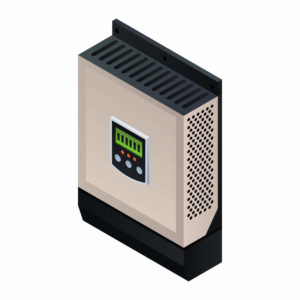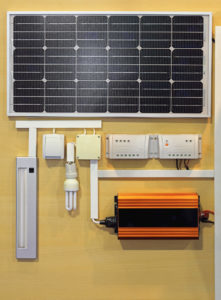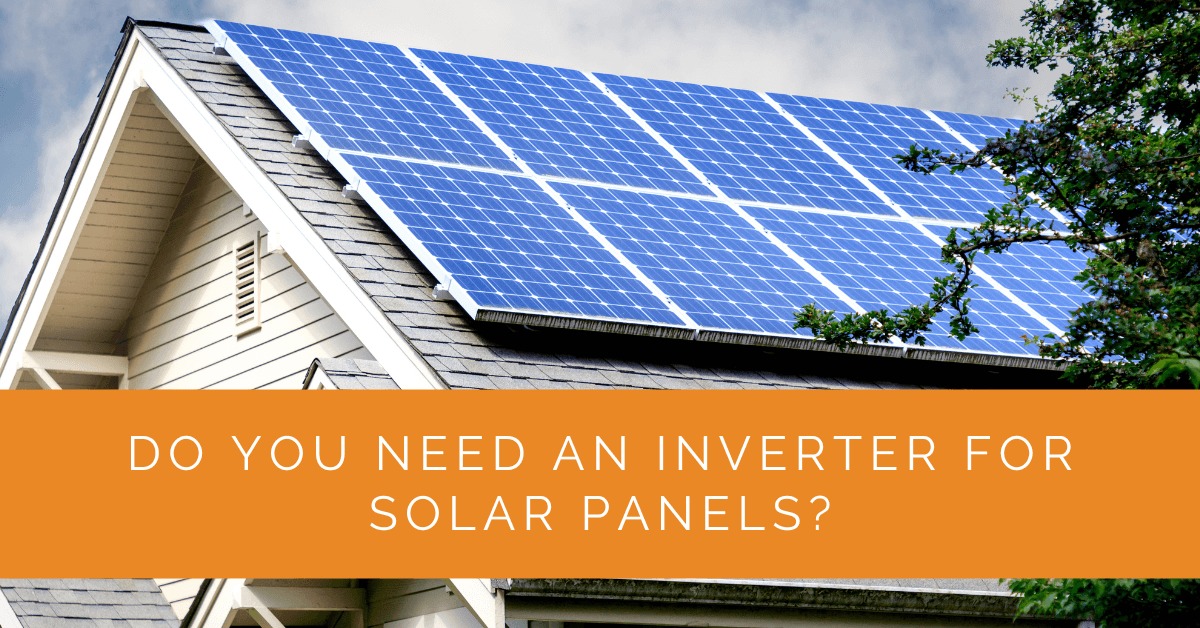In solar power systems, inverters are crucial in converting the direct current (DC) electricity generated by solar panels into usable alternating current (AC) electricity. Understanding whether you need an inverter is vital when considering the installation of solar panels. This article aims to demystify inverters and highlight their significance in solar panel systems.
Contents
- 1 Key Takeaways
- 2 Understanding Solar Power Systems
- 3 What Does an Inverter Do?
- 4 Types of Solar Inverters
- 5 Determining the Need for an Inverter
- 6 Case Study: Implementing the Right Inverter for Optimal Solar Power Utilization
- 7 Expert Insights From Our Solar Panel Installers About Inverters for Solar Panels
- 8 Experience Solar Excellence with Us!
- 9 Conclusion
Key Takeaways
- Inverters are essential for solar panel systems as they convert the direct current (DC) electricity generated by solar panels into the alternating current (AC) electricity required for most household appliances and the electrical grid.
- Various types of inverters are available, including string inverters, microinverters, power optimizers, and hybrid inverters, each with its own advantages and considerations.
- The need for an inverter depends on whether the system is grid-tied or off-grid, the compatibility of appliances with DC power, and the inclusion of energy storage through a battery bank. Consulting with professionals is crucial to determine the appropriate inverter solution for your solar panel system.
Understanding Solar Power Systems
To fully grasp the significance of inverters in solar panel systems, it’s crucial to understand the entire solar power system’s functioning. Solar power systems contain various components that convert sunlight into usable electricity for residential or commercial use. At the heart of the system are the solar panels, which consist of photovoltaic cells that absorb sunlight and generate direct current (DC) electricity.
However, most household appliances and the electrical grid operate on alternating current (AC) power. This is where the inverter comes into play. The inverter is responsible for converting the DC electricity produced by the solar panels into AC electricity that can power your home or business. In essence, the inverter bridges the solar panels and the electrical devices, ensuring compatibility and seamless integration.
What Does an Inverter Do?
The primary function of an inverter in a solar panel system is to convert the DC power generated by the solar panels into AC power. This conversion is crucial because AC power is the standard form of electricity used by most electrical appliances and the power grid. By converting DC to AC, the inverter enables you to power your lights, electronics, and other devices seamlessly, just as you would with electricity from the grid.
In addition to converting power, inverters also play a vital role in maintaining the stability and quality of the electricity output. They regulate the voltage and frequency of the AC power to ensure a consistent and reliable supply. This helps protect your electrical devices from damage and ensures optimal performance.

Types of Solar Inverters
Several types of inverters are available for solar panel systems, each with unique characteristics and applications. Understanding these types can help you choose the most suitable inverter for your needs. Let’s explore them in detail:
1. String Inverters
String or central inverters are the most common type used in residential and commercial solar installations. They are connected to multiple solar panels in a series, forming a string. The DC power generated by the panels is channeled through the string inverter, which then converts it into AC power for use in your home or business.
One advantage of string inverters is their cost-effectiveness. They are generally more affordable compared to other types of inverters. However, it’s important to note that string inverters operate on a string-level basis. This means that if one panel in the string experiences shading, dirt, or a malfunction, the performance of the entire string can be affected.
2. Microinverters
Microinverters are an alternative to string inverters, offering greater flexibility and performance optimization. Unlike string inverters connected to multiple panels, microinverters are installed on each solar panel. Each panel operates independently, converting its DC power to AC power.
The key advantage of microinverters is that they maximize the energy output of each panel. This is particularly beneficial when shading or performance variations occur across different panels. With microinverters, the impact of shading or malfunctions on one panel is limited to that panel, ensuring that the rest of the system operates at its full potential.
3. Power Optimizers
Power optimizers are another option combining the advantages of both string and microinverters. Similar to microinverters, power optimizers are connected to each solar panel. However, instead of converting DC power to AC power directly, they optimize the output of each panel and transmit the power to a central string inverter for final conversion.
The main benefit of power optimizers is that they mitigate the impact of shading or panel performance variations, similar to microinverters. By individually optimizing the power output of each panel, power optimizers ensure that the overall system operates at its maximum efficiency. Power optimizers also offer additional features, such as module-level monitoring, which allows you to track the performance of each panel in real-time.
4. Hybrid Inverters
Hybrid inverters are designed for solar power systems incorporating energy storage through a battery bank. These inverters offer the capability to manage both solar energy and stored battery energy, providing greater flexibility and control over your energy usage.
Hybrid inverters can store excess solar energy generated during the day in the battery bank for later use when solar production is lower or during power outages. This allows you to maximize self-consumption of solar energy and reduce reliance on the grid, enhancing your energy independence and resilience.
Hybrid inverters can operate in grid-tied mode, export excess energy to the grid, or in off-grid mode, which functions independently without grid connection. This versatility makes them an excellent choice for those seeking a comprehensive energy system that combines solar power generation, energy storage, and grid interaction.

Determining the Need for an Inverter
Determining whether you need an inverter for your solar panel system depends on several factors. Here are some key considerations:
- Grid Connection: You will need an inverter if you plan to connect your solar panel system to the electrical grid. Grid-tied systems require inverters to convert the DC power from the solar panels into AC power that can be fed back into the grid or used to power your home.
- Off-Grid Systems: In some cases, you may opt for an off-grid solar system, where you are entirely independent of the electrical grid. In this scenario, an inverter may not be necessary if all your appliances and devices can operate on DC power directly. However, it’s important to note that most standard household appliances and electronics are designed for AC power.
- DC Appliances: You may not need an inverter if you have specific DC appliances or devices that can operate directly on DC power, such as certain lighting systems or RV appliances. However, it’s crucial to ensure compatibility with DC power and understand the limitations of operating solely on DC.
- Battery Systems: If you plan to incorporate energy storage through a battery bank, a hybrid or inverter specifically designed for hybrid systems is required. These inverters manage the charging and discharging of the batteries and the conversion of DC power to AC power for use during non-solar hours.
It’s essential to consult with solar professionals or reputable solar providers to assess your specific needs and determine the appropriate inverter solution for your solar panel system. They can evaluate factors such as system size, energy usage patterns, grid interconnection requirements, and future scalability to guide you in selecting the right inverter for optimal system performance.
Case Study: Implementing the Right Inverter for Optimal Solar Power Utilization
Background
At Solar Panels Network USA, we recently assisted a homeowner in upgrading their solar panel system with an efficient inverter solution. The goal was to enhance the system’s performance and ensure compatibility with household appliances, thereby maximizing the benefits of solar energy.
Project Overview
The project began with a comprehensive assessment of the homeowner’s existing solar panel setup and energy usage. This included evaluating the type of solar panels, their energy output, and the compatibility of current components. Our primary focus was on selecting the most suitable inverter to meet the homeowner’s energy needs effectively.
Implementation
Evaluating the Existing System
We started by analyzing the homeowner’s energy consumption and the current solar panel system’s output. This step was crucial to understand how well the system was performing and to identify any areas for improvement. The assessment revealed that while the solar panels were functioning optimally, the lack of an efficient inverter was limiting the system’s potential.
Selecting the Appropriate Inverter
Based on the energy needs and the system’s design, we recommended a hybrid inverter. This type of inverter was chosen because it could manage both solar energy and stored battery energy, providing greater flexibility and control over energy usage. The hybrid inverter also supported future scalability, allowing the homeowner to add energy storage solutions later.
Installing the Inverter
The installation process involved integrating the new hybrid inverter with the existing solar panel system. This included connecting the inverter to the solar panels and the household electrical system, ensuring all connections were secure and optimized for performance. We also installed monitoring systems to track the performance of the solar panels and the inverter in real-time.
Implementing Monitoring Systems
We installed a robust monitoring system that provided real-time data on energy production and consumption. This helped the homeowner track the performance of both the solar panels and the inverter, allowing for timely adjustments and maintenance.
Regular Maintenance Practices
To ensure the longevity and optimal performance of the solar panel system, we recommended regular maintenance practices. This included cleaning the panels, checking for loose connections, and inspecting the inverter for any signs of wear or malfunction. Regular maintenance helped in early detection of issues and ensured the system operated at peak efficiency.
Results
The implementation of the hybrid inverter significantly improved the system’s efficiency. The homeowner experienced a noticeable increase in the amount of solar energy harnessed and utilized. The inverter’s ability to manage and convert DC to AC power seamlessly ensured that all household appliances operated smoothly. Additionally, the system’s stability and reliability were enhanced, providing consistent and quality power supply.
Summary
This case study highlights the importance of selecting and installing the right inverter for a solar panel system. By thoroughly assessing the existing setup and energy needs, Solar Panels Network USA was able to recommend and implement a hybrid inverter solution that significantly improved the system’s performance. The homeowner now enjoys enhanced energy efficiency, stability, and the potential for future scalability.
Expert Insights From Our Solar Panel Installers About Inverters for Solar Panels
Inverters are the heart of any solar panel system. They convert the DC power generated by the panels into AC power, which is what we use in our homes. Without an inverter, your solar panels wouldn’t be able to power your appliances.
Senior Solar Installer
Choosing the right type of inverter is crucial. Whether it’s a string inverter, microinverter, or a hybrid system, each has its unique advantages and is suited to different applications. It’s important to match the inverter to your specific energy needs and system setup.
Lead Solar Technician
Inverters not only convert power but also ensure the stability and quality of the electricity supplied. They protect your electrical devices and maintain optimal performance of your solar system.
Solar Installation Specialist
Experience Solar Excellence with Us!
Trust in Solar Panels Network USA, where our seasoned experts deliver top-quality solar solutions for homes and businesses nationwide. With a legacy of countless successful installations and a commitment to sustainable energy, we’re your reliable partner in the solar journey. Ready for a brighter, eco-friendly future? Call us now at (855) 427-0058 and harness the power of the sun!
Conclusion
Inverters are a vital component of solar panel systems, converting DC power from solar panels into usable AC power. By understanding the different types of inverters available, such as string inverters, microinverters, power optimizers, and hybrid inverters, you can make an informed decision about the type of inverter that best suits your needs. Whether you’re looking for optimized performance, shading resilience, or the ability to incorporate energy storage, there’s an inverter solution for every solar panel system. It’s crucial to assess the specific requirements of your installation, including the type of system, energy usage patterns, and grid connection, to determine whether an inverter is necessary and which type is most suitable.
Understanding the role of inverters in solar panel systems is essential for anyone considering solar energy. Whether you opt for a string inverter, microinverters, power optimizer, or hybrid inverter, each type has unique advantages and considerations. By consulting with reputable solar professionals and evaluating your specific needs, you can make an informed decision and maximize the benefits of solar power generation.
Harnessing the sun’s energy through solar panels is an environmentally friendly and cost-effective way to power your home or business. With the right inverter, you can ensure efficient and seamless conversion of DC power into usable AC power, enabling you to enjoy the benefits of solar energy while contributing to a greener future.
So, if you’re ready to embrace the sun’s power and embark on your solar journey, evaluate the need for an inverter and choose the type that suits your solar panel system best. The right inverter will unlock the full potential of your solar energy, bringing you closer to energy independence and a sustainable future.
About the Author
Solar Panels Network USA stands at the forefront of solar energy solutions, driven by a team of seasoned solar engineers and energy consultants. With over decades of experience in delivering high-quality solar installations and maintenance, we are committed to promoting sustainable energy through customer-centric, tailored solutions. Our articles reflect this commitment, crafted collaboratively by experts to provide accurate, up-to-date insights into solar technology, ensuring our readers are well-informed and empowered in their solar energy decisions.

